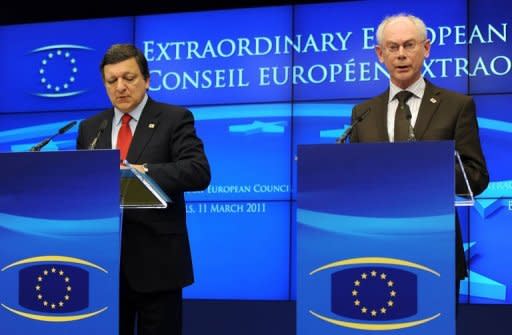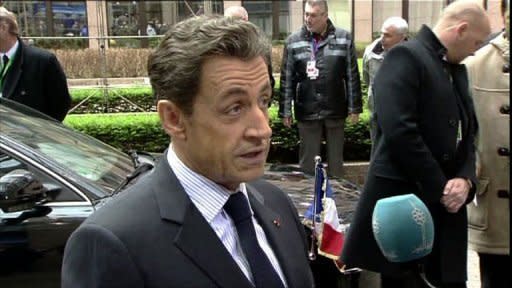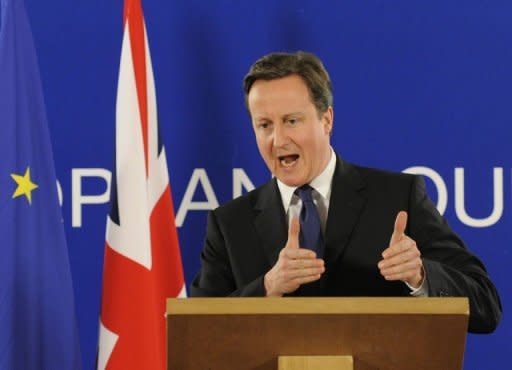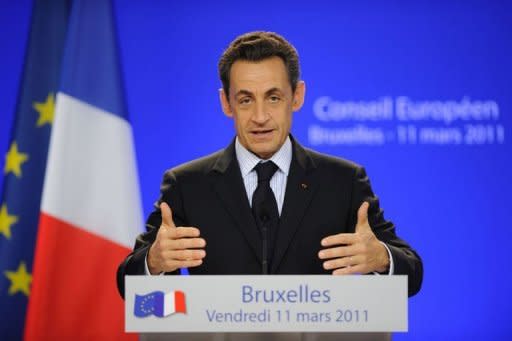Europe vows to safeguard Libyan civilians via 'all options'
Europe's leaders Friday ramped up pressure on Moamer Kadhafi, agreeing to dialogue with his opponents and protect Libyan civilians "by all necessary means" while stopping short of outright military threat. Winding up an emergency summit on the war unfolding across the oil-rich nation, European Union leaders demanded Kadhafi "relinquish power immediately" and deemed an opposition council based in the eastern city of Benghazi a "political interlocutor". The six-hour face-off between divided leaders of the 27-nation bloc capped 48 hours of crisis meetings over Libya in Brussels, also involving NATO defence ministers and EU foreign ministers. "The use of force, especially with military means, against civilians is unacceptable and must stop immediately," the EU said in a statement. "The safety of the people must be ensured by all necessary means." However there was no mention of calls from Britain and France for a no-fly zone over Libya while French President Nicolas Sarkozy's strident demands for "targeted action" against Kadhafi as the talks opened went unheeded. "In order to protect the civilian population," the statement said, "member states will examine all necessary options, provided that there is a demonstrable need, a clear legal basis and support from the region." A tripartite summit gathering the EU, the Arab League and the African Union is to be held "soon", the EU said. The Arab League meets Saturday while the AU on Thursday categorically rejected the prospect of military intervention in Libya. As the Brussels summit opened, Sarkozy proposed "targeted actions" should Kadhafi attack his people with chemical weapons or air power "on condition that the UN wishes, that the Arab League accepts and that the Libyan opposition, which we hope to see recognised, agrees". But there was little support for military solutions, with German Chancellor Angela Merkel notably saying she was "fundamentally sceptical" as to the prospect of military intervention. "Given the situation today, I don't see a military engagement," she said. Her Foreign Minister Guido Westerwelle too urged caution over moves to impose a no-fly zone. "What would we do when it doesn't work? Would we then go in with ground troops? I am very sceptical about this," he said as the summit started. Europe's leaders too refused to sign on to France's unilateral decision this week to recognise Kadhafi's opponents as the rightful representatives of Libya, agreeing instead to deem the opposition based in the eastern city of Benghazi as a partner for dialogue. Again, Berlin warned against moving too fast. "I advise everyone to look very closely to see if these people who say they represent the people are really speaking in the name of the people," said Westerwelle. "Certain members of the opposition were until recently members of the Khadafi regime," he added. With the EU already slapping the world's toughest sanctions on Libya, British Prime Minister David Cameron urged his EU partners to choke off the oil billions sustaining Kadhafi's "horrors" in Libya. Cameron promoted the idea of a further squeeze on financial assets after the EU froze five state vehicles including an overseas investment fund holding massive assets and investments, said to be under Kadhafi's family control. The British premier said "consideration is being given" by EU leaders after the summit to moves that could deprive Kadhafi of funds for his battle to win back rebel territory. "The point was made very powerfully by Cathy Ashton (the EU's foreign affairs chief) that the regime is still in receipt of very large amounts of money from its oil revenues. "We do need to look at that," Cameron said, warning it would be a very "complicated" job, "as many of the oil fields are in rebel territory". "It's one we need to get right," he stressed.





